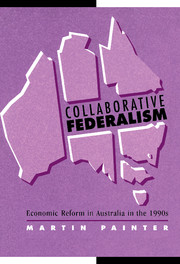Book contents
- Frontmatter
- Contents
- List of Abbreviations
- Acknowledgements
- 1 National Problems, Federal Solutions
- 2 The Theory and Practice of Cooperative Federalism
- 3 SPC, COAG and the Politics of Reform
- 4 Achieving Cooperation: Players and Processes
- 5 The Machinery of Intergovernmental Relations: An Institutional Analysis
- 6 The Institutions of Collaborative Federalism
- 7 Duplication and Overlap: New Roles, Old Battles
- 8 The Future of Collaborative Federalism
- List of References
- Index
3 - SPC, COAG and the Politics of Reform
Published online by Cambridge University Press: 08 January 2010
- Frontmatter
- Contents
- List of Abbreviations
- Acknowledgements
- 1 National Problems, Federal Solutions
- 2 The Theory and Practice of Cooperative Federalism
- 3 SPC, COAG and the Politics of Reform
- 4 Achieving Cooperation: Players and Processes
- 5 The Machinery of Intergovernmental Relations: An Institutional Analysis
- 6 The Institutions of Collaborative Federalism
- 7 Duplication and Overlap: New Roles, Old Battles
- 8 The Future of Collaborative Federalism
- List of References
- Index
Summary
The main aim of this chapter is to provide a narrative account of the work done by the Special Premiers' Conferences and the Council of Australian Governments (SPC and COAG) between 1990 and 1997. A couple of themes will emerge: first, that a considerable number of cooperative schemes and collaborative institutions were created during this period; but second, that the politics of reform was typically adversarial, and that the outcomes in some cases remained strongly contested by some of the protagonists. One recurring issue was the threat of Commonwealth domination, and in response the challenge of state resistance. For the sake of economic reform, the Commonwealth needed state cooperation. The Commonwealth had taken the lead during the 1980s, with deregulation of the financial markets in 1983-84, the ending of the two-airline policy and commercialisation of business enterprises, tariff reductions in 1988 and beyond and, by the end of the decade, halting steps in a privatisation program. It was now over to the states, as many saw it: electricity, gas, water, the transport industries, education and training, health and so on were all state-managed industries, while the states also were responsible for the existence of interstate barriers to free movement of goods and services, and a plethora of state regulatory regimes and instruments. The states were depicted as laggards. As Bob Hawke put it in his July 1990 speech: ‘microeconomic reform … is absolutely essential if we are to have a more competitive economy. My Government has acted to reform … areas of virtually exclusive Commonwealth control. We still have unfinished business … In advancing to the next stage, the co-operation of the states is essential …’.
- Type
- Chapter
- Information
- Collaborative FederalismEconomic Reform in Australia in the 1990s, pp. 32 - 60Publisher: Cambridge University PressPrint publication year: 1998



